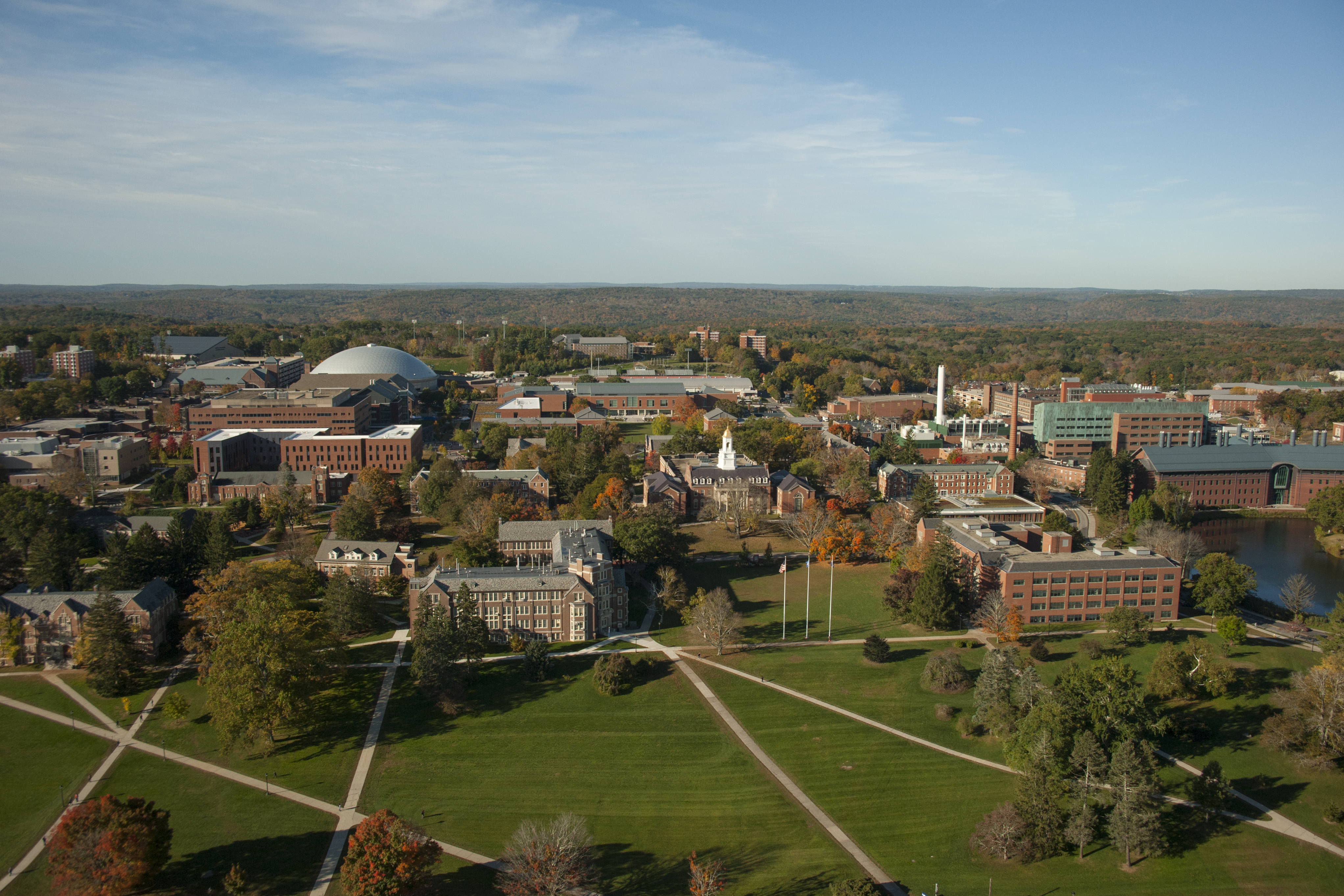An innovative UConn program is promoting peace and regional integration in the Middle East and North Africa by building on the region’s shared religious and cultural roots.
UConn’s Abrahamic Programs for Academic Collaboration in the MENA Region is an Office of Global Affairs initiative that fosters intercultural communication, community engagement, and research in pursuit of the common good.
The non-denominational initiative builds on the intellectual foundations of Abrahamic thought and the Middle East and North African (MENA) region’s three monotheistic faiths – Judaism, Christianity, and Islam – all of which emphasize the value of acquiring knowledge, using reason, and acting with wisdom.
“The core of our Abrahamic Program is academic cooperation in the MENA region,” says Daniel Weiner, UConn’s vice president for global affairs and a professor of geography in the College of Liberal Arts and Sciences.
“We are reimaging a Middle East where the top scientists and scholars work together with practitioners and governments to address difficult global challenges with innovative solutions while also supporting entrepreneurial ecosystems,” he adds. “We are bringing people and institutions together in a region where this can be difficult due to political realities on the ground. And we are now bringing this spirit of mutual respect and cooperation to UConn and the State of Connecticut.”
UConn Interim President Radenka Maric described the initiative as a natural complement to the University’s core educational values.
“The UConn Abrahamic Initiative is an impactful global program that promotes peace and diversity of identity, politics, and thought,” she says. “I am encouraged by its programming, which successfully fosters listening, reciprocal learning, and relationship building while also addressing critical societal issues.”
The UConn Abrahamic Programs initiative has its roots in a 2017 symposium at UConn with Yale Divinity School. Scholars from higher education institutions in the MENA region joined academics at that symposium from UConn, Yale, and several other U.S. universities to examine the many intellectual and cultural intersections of Judaism, Christianity, and Islam in the Medieval and Early Modern Mediterranean.
Building on that foundation, the Abrahamic Programs initiative worked with the Yale Forum on Religion and Ecology and others to deliver a 2019 workshop in Rhodes, Greece. That workshop took a sweeping look at cross-cultural interest in understanding and addressing environmental change, and ways in which lessons of the three Abrahamic faiths can help local and cross-border sustainability efforts.
The initiative soon will also add to its support of innovation and entrepreneurship in the MENA region with enhanced programming being launched in partnership with UConn’s Peter J. Werth Institute for Entrepreneurship and Innovation. The programming will be designed to engage, convene, and support university-based innovation and entrepreneurial ecosystem(s) in the MENA region. It will also deepen the economic development connections between Connecticut and the region.
“People of Abrahamic traditions in the region have shared histories and cultures,” says Zahra Ali, UConn’s director of global partnerships and outreach in the Office of Global Affairs.
“Recognizing this, the Université Internationale de Rabat and Ben Gurion University of the Negev have partnered with us on tri-lateral programming that celebrates music, food and art of the region,” Ali says.
An example of this cross-border cultural collaboration can be seen in last year’s co-hosted Mimouna Celebration, a traditional Maghrebi Jewish celebration dinner with music and food. In Morocco and Israel, it has historically been a celebration with neighbors and brings people from the three Abrahamic faiths together by focusing on the shared traditions and culture.
“We’ve also begun an annual student dialogue series on global challenges, such as public health and environmental change, which bring together students from our three institutions for virtual discussions on how these challenges impact communities and how they’re being addressed,” Ali says, adding that as the dialogues series continues, they hope to integrate an in-person component as well.
UConn’s Abrahamic Programs also recently co-hosted a highly successful discussion welcoming the Sharaka Delegation for Peace, an event offered in conjunction with UConn’s Office of Diversity, Inclusion, and Justice; Center for Judaic Studies & Contemporary Jewish Life; UConn Hillel; Middle Eastern Cultural Programs, Muslim Students Association, and the Consulate General for Israel.
Sharaka delegation members who spoke at the event shared their experiences of visiting other nations and creating the kind of people-to-people partnerships that are so critical to advancing peace and understanding in the region.
Sharaka, which is Arabic for “partnership,” is an Israeli-Emirati non-political NGO (non-governmental organization) formed in 2020 after the signing of the Abraham Accords. It consists of members from Israel, the United Arab Emirates (UAE), Bahrain, and the United States, and is committed to peace and warm ties between individuals and groups.
At a recent afternoon in Storrs, Sharaka delegates shared their reasons for joining the organization, ways in which they observe and celebrate the commonalities of their cultures, and how their lives have been enriched by meeting people from other nations and religions.
“You have to talk about the Middle East as a melting pot of all of these different ethnic groups and religious groups that have always worked together through trade, through culture, through art, and even through religious interaction that have shaped other people’s religions,” said delegation member Dan Feferman, an Israeli American author, researcher, and speaker.
“We’ve had kind of a break from that in recent times, and maybe this is a chance to get back to those synchronous times,” he said.
They also discussed the impact of the Abraham Accords signed in September 2020 by leaders from Israel, the United Arab Emirates, and Bahrain, followed three months later by a normalization agreement between Israel and Morocco.
Fatema Alharbi, a Bahraini and Sharaka’s director of Gulf affairs, shared the feelings of wonder and excitement she experienced when she visited Israel, describing how strangers approached them on the street to welcome them and invite them home for Shabbat dinners.
She said she realized that the Israel she saw in the media was different than the Israel she was experiencing, and had such a positive visit that she returned for a second trip last fall.
Other members of the Sharaka delegation also described visiting other nations, and building strong personal and professional relationships with people from various cultures and backgrounds – exactly the kind of connections envisioned through the Abraham Accords.
Yahya Mahamid, an Israeli Arab, said he and other Israeli Arabs had long been denied entry to most Arab countries because of their Israeli citizenship. When he finally had an opportunity to visit the United Arab Emirates (UAE) after the accord, he said, he was very worried about how he would be received, but was met with “open arms, open hearts, and admiration.”
“The Abraham Accords gave us such a gateway to the Arab world. It was very, very surreal to be landing in Dubai, talking to the Arabs in the Gulf,” he said. “The connections, the conversations, and the realization that we are very much alike was the crown jewel of that trip.
“I made it my mission to advance those kinds of relations,” he added. “At the end of the day, when we talk about ‘the other side,’ the other side has a family, and the other side has problems and challenges. So, this is what we do in Sharaka: We bring the other sides together so they can learn about each other and learn to live together and coexist.”
—
The UConn Abrahamic Programs for Academic Collaboration in the MENA Region initiative is grateful for the generous support it receives from Gary Gladstein ’66 (CLAS), ’08 (HON) and Dr. Phyllis Gladstein; Eileen and Jerry Lieberman; the Levant Foundation; and others.
Individuals or organizations interested in learning more about ways to support the initiative may do so through the UConn Abrahamic Initiative Fund of the UConn Foundation. Gifts to the fund may be deductible as a charitable contribution for federal income tax purposes.



